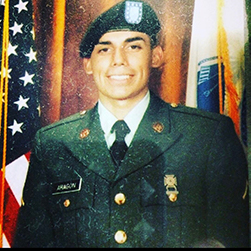A Word from an Apprentice What does Apprenticeship Mean to You?
"My name is Joseph Aragon III, and I’m a United States Army veteran and third-year Commercial Electrical Apprentice with WECA Member Contractor Reyff Electric Company.
Before becoming a commercial electrical apprentice, I served as a 63B-wheeled vehicle mechanic in Afghanistan and at Joint Base Lewis-McChord just outside of Tacoma, Washington. My Army career instilled in me principles like strong leadership, an excellent work ethic and more. I’ve applied these principles in both the classroom and on the jobsite during my apprenticeship. For this reason, I absolutely recommend an electrical career not only for veterans, but also for those going into the military.
There’s a lot that I like about my commercial electrical apprenticeship with WECA, but I really like my instructor James Hall’s teaching style. I appreciate how much detail he puts into his instruction, and his willingness to pause to further explain concepts to his students who have questions.
I know that apprenticeship can be hard, but when you’re in doubt or grappling with a particularly rough patch in your apprenticeship, remember the ultimate goal and why you decided to pursue being an electrician. Don’t forget that we light the way."
From the Western Electrical Contractors Association
Joseph is an excellent example of how apprenticeships can be advantageous for veterans.
Eligible veterans enrolled in one of WECA’s three apprenticeship programs can receive G.I. Bill benefits upon approval. In addition to G.I. Bill benefits, veteran apprentices, like all of our apprentices, receive a salary from their employer and have their apprenticeship program tuition paid for by their employer. WECA also accommodates active duty service members, and works with their employers to provide flexible scheduling that works with active duty military leaves.
Veterans also typically already possess desirable traits for employing contractors, such as leadership, strong work ethics, familiarity with jobsite safety procedures, the ability to work well under pressure and being technically and mechanically inclined. Additionally, if the veteran apprentice previously worked in the electrical field, or a related one, during their service, they can build on their previous knowledge and experience.
WECA’s apprenticeship programs involve hands-on work, and apprentices and certified electricians work together in a cohesive team atmosphere, much as service members do in the armed forces. Electrical apprentices have a dynamic workload, and those who are veterans will likely appreciate that just as in the armed forces, every day on the job can be different.
WECA’s three apprenticeship programs have many veterans enrolled. Veteran apprentices are likely to find a fellow veteran in their classes or on the jobsite, extending the camaraderie enjoyed by those who have served.
February 2022


